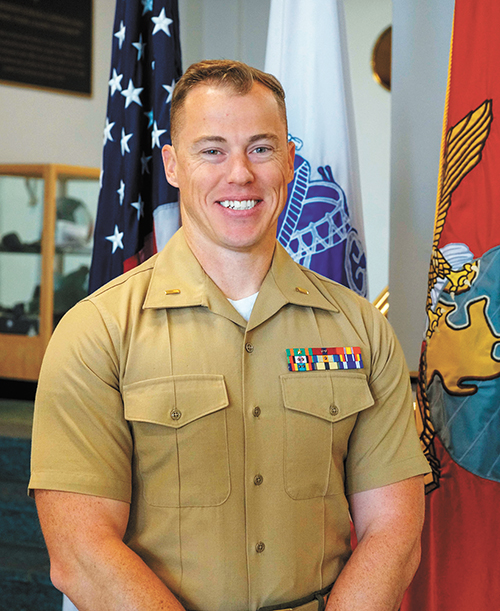Gilman kennel unleashes top detection dogs to serve and protect
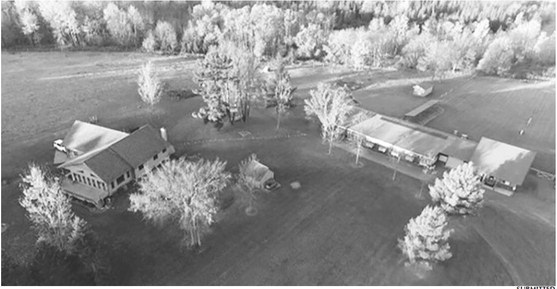

In a time when it can be difficult to feel safe, who should we rely on to stand between us and the bad guys? Man’s best friend, of course.
Sonny and Shannon Piekarz, owners of Hay Creek Kennel, are pushing past boundaries and redefining what almost everyone thought dogs were able to do.
We all know that dogs can be trained to detect a multitude of substances in a bag or package, or on a person. You’ve seen dogs lead by handlers sniffing suitcases at a baggage conveyor or smelling people in line at a sporting event. While useful, this dog is limited to items and people pointed out by its handler in its general vicinity. But what if that same dog could walk into a building and follow a scent trail throughout the entire area? What if that animal could smell gun metal in a school and track it to its location, or scent explosive residue in an NFL stadium and find its source? And what if every cargo facility, school, event center and travel hub had a dog like this on their payroll?
In an age where school shootings have become a sad reality and safety and security can feel hard to come by, a dog trained in such a manner could save thousands of lives.
This is exactly what Sonny, Shannon, and their team at Hay Creek Kennel envision for the future.
Located in Gilman, HCK is the only private sector Kennel in the country certified to breed and train dogs in Vapor Wake. Vapor Wake is the method of allowing the dog to identify and track a vapor trail through the air, leading the handler instead of following. This gives the dog the freedom to pursue the vapor and trace it to either a moving or fixed object.
Because Vapor Wake is a relatively new method and because these dogs require a significant amount of training, there just aren’t enough dogs to fill the need. That’s where Hay Creek Kennel comes in.
But HCK hasn’t always specialized in Vapor Wake dogs. The kennel opened to the public in 2000, offering a multitude of services from grooming to obedience. In addition, Sonny spent several months each year in Texas where he managed a commercial hunting operation which he did for 17 years while Shannon worked at a local bank and they raised their family. In 2017, while in Texas, a client from Kentucky who observed Sonny’s natural compatibility with upland hunting dogs asked him why he wasn’t working with bomb detection dogs. Not one to back down from a challenge, Sonny flew to Kentucky to meet with a group of investors who offered to bankroll the project. Having faith in themselves, the Piekarzes opted to risk it all and finance the venture on their own.
Still on good terms with the investment group, they encouraged Sonny to travel all over and observe other operations to determine the best way to begin. After charming his way through a few doors, Sonny and Shannon knew how they wanted to move forward. The Piekarzes knew their future was in Vapor Wake dogs.
“It’s challenging, and then once I started to learn a little bit about it, I’ve seen the impact, the shortage of these dogs,” said Sonny. “We had mastered the upland world,” said Shannon of their success with bird dogs. The Piekarzes were hungry for more.
Their first step was Auburn University. Located in Alabama, Auburn’s Canine Performance Sciences (CPS) department describes their mission as “to innovate canine detection technology by exploring basic and applied research frontiers in olfaction, behavior, genetics, and physical performance.” Auburn has been developing this program for about 24 years, providing assistance to entities such as the FBI and CIA.
“As I got to meet those people, that’s when we knew that this was it, this was the best in the business,” said Sonny. “I met an individual by the name of Bart Rogers,” he continued. “We clicked, we talked the same language, he knew what was missing, he also was very passionate about making it happen.”
Rogers is in charge of CPS at Auburn University. Rogers trained Sonny and Shannon in Vapor Wake.
“The culture of true working dogs still exists in that part of the country, making access to quality bloodlines more accessible, but more importantly it’s HCK's open mindedness, humbleness, hard work and determination in their pursuit of learning how to shift from training the highest quality bird dogs to
See KENNEL on page 12 producing the highest quality single-purpose detection dogs,” Rogers wrote. “In reality they didn't need to be taught how because at the end of the day they are essentially doing the same thing, they just needed to learn to speak two different languages; bird dog and detection dog,” he continued. “My role was to help them realize they already had the capability, they just needed a translator.”
“He came home from Auburn and that was it, at that point we were researching dogs and where we were buying puppies, it was happening,” said Shannon.
But since Sonny and Shannon had decided to forgo investors and go out on their own, they would have to work twice as hard. Sonny continued guiding hunts in Texas while Shannon began the training program back at home. As Sonny traveled out of state several months out of the year, Shannon hit the ground running, working dogs and running the kennel when Sonny was absent.
The Piekarzes juggled the guide work in Texas and operating HCK for about a year.
When that year was up, Sonny and Shannon maintained that same passion and drive, going all in and obtaining a contract with TSA, a huge feat for a small business just starting a new project. But it wasn’t meant to be.
“It was annihilated by COVID, we never ever fulfilled it,” Sonny said. They described going through Lackland Air Force Base in Texas as part of that contract on the last day of February, where staff pointed out a building containing 12 people that were quarantined with COVID.
Almost immediately after that, the country began to shut down. “We kind of went belly up,” recalls Sonny. “Everything was shut down,” said Shannon. HCK still housed 20 dogs which were sold to maintain operation expenses.
Always adaptable, the Piekarzes went back to their roots. “The bird dog business exploded due to COVID,” said Sonny. “All the pounds emptied, everyone adopted a dog, so our obedience and our bird dogging was through the roof,” Shannon said. They continued offering their upland and obedience services until around July of 2022 when Auburn University called expressing a desire to resume work in Vapor Wake development.
While Sonny and Shannon already had the motivation and determination, Auburn University was instrumental in providing them the tools, even giving HCK the first license ever provided for training and breeding Vapor Wake candidate dogs.
“Our purpose in licensing HCK is to help increase the supply of domestically produced detection dogs while also ensuring quality and capability – we knew they were the right partner for AUCPS to do this,” Rogers wrote of Auburn’s partnership with HCK.
But it takes a special dog to excel in this field.
“Just like a human, we all have our traits, we all have our strong points and our weak points,” said Sonny.
So what what traits make up the best Vapor Wake candidate?
“Bold,” Shannon said without hesitation. “He’s not the dog everybody else wants to pick; he almost lacks selfpreservation.”
The ideal Vapor Wake candidate dog might even be pretty hard to handle.
“We want them 10 foot tall and bulletproof,” said Sonny.
Most of these dogs are males. “Females are thinkers,” said Shannon. HCK requires a dog that can spring into action without overthinking.
HCK buys puppies from breeders who understand the type of personality that they’re looking for, the breeders selecting the literal picks of the litter for Sonny and Shannon. “They were a huge part of our success,” said Sonny, noting that these breeders, mostly located in Minnesota and Wisconsin, are some of the best in the country.
The Piekarzes now breed their own dogs as well. They are very selective, reporting that their schooling for Vapor Wake begins in the womb with unborn puppies picking up on their mother’s activities as she goes through her own training. Training for the puppies themselves begins almost immediately, though all aspects of schooling is age appropriate. They learn to hunt a rubber ball, following its scent until they have recovered it no matter how cleverly it’s hidden. HCK has been granted access to places like Hixwood Metal and Farm and Fleet, large buildings with lots of nooks and crannies to hide a ball.
The dogs become completely absorbed with that ball, so much so that they’ll do almost anything to have it, which is all part of the plan.
The Vapor Wake candidate dogs spend almost the entire first year of their lives with HCK, soaking up as much as they can before graduating to Global K9 Protection Group, a company dedicated to providing large scale operations with dogs that suit their specific needs. GK9PG takes the dogs trained by HCK and finishes them for a career that works best with each dog’s personality type. The dogs’ reward for their hard work? That same delicious rubber ball.
During that finishing training, GK9PG imprints each dog for the detection need that suits that dog the best, such as weapons, explosives, zebra muscle, mold, cancer screening, COVID-19 screening, human remains, diabetes, seizures, and even autism screening. The dogs usually spend four to six months with GK9PG before moving on to a more permanent job.
The dogs are classified under three different tiers; the first tier is composed of dogs that excel in the special forces, special mission projects, and of course Vapor Wake dogs that can detect explosives or gun metal.
Tier two dogs tend to be cargo screeners; they may not have enough nerve or be bold enough to operate in the first tier, but they love to work and hunt.
Tier three dogs are usually emotional support animals. HCK does not produce tier three dogs because their puppies are closely screened before they even start training.
While their dogs are hard workers and spend much of their time in training, HCK emphasizes quality of life for their animals. There are no days off for staff as their dogs receive care and attention nearly around the clock with Shannon even watching the dogs on a camera linked to her cell phone when she’s away.
“We are out here seven days a week,” said Sonny. HCK boasts 40 fenced in acres intended to create an ideal living situation for each animal. Their dogs only see kennel time to eat and sleep, spending a majority of their lives at HCK outside training. The mental and emotional needs of their dogs come first, with Sonny and Shannon noting that happy dogs are better at their jobs. Dogs that are bored can be destructive and display negative behaviors.
But two people can’t care for and condition 30 plus dogs alone.
HCK employs two additional handlers, Lexi Chaplinski and Brittany Rosemeyer, to ensure that each dog gets the attention and coaching that it requires. Chaplinski, a Gilman native, and Rosemeyer, who migrated to Gilman from Thorp, are valuable to the program.
Chaplinski has been with HCK since she was 12. “Lexi is a huge part of this equation,” said Sonny. “She’s interned at Auburn, she took a job there at 17,” he continued. “She is our future. She’s got the knowledge, she’s got the work ethic, she’s a phenomenal dog hand.”
“Lexi has the skills and capability well beyond her years,” wrote Rogers. “She’s a natural at what most people have to be taught in terms of how to interact with and work with the dogs. She’s a genuine person and hard worker and is passionate about what she does.”
Chaplinski opted to grow her career at HCK, citing her employers and the field as reasons to remain with the Piekarzes.
“There are a few reasons behind why, but the first few that come to mind are passion, who you work for, and
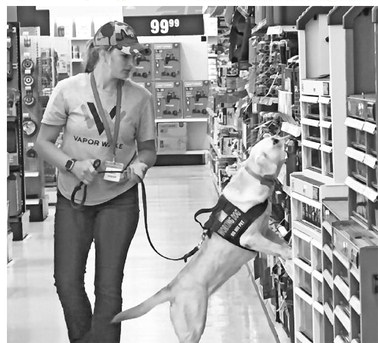
Handler Lexi Chaplinski follows a Vapor Wake Detection candidate dog through a hardware store as the dog hunts for a rubber ball which has been hidden for the dog to track. SUBMITTED
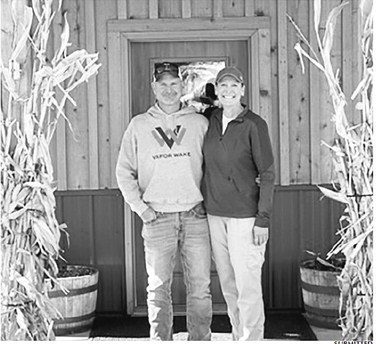
Sonny (left) and Shannon Piekarz in front of Hay Creek Kennel. SUBMITTED
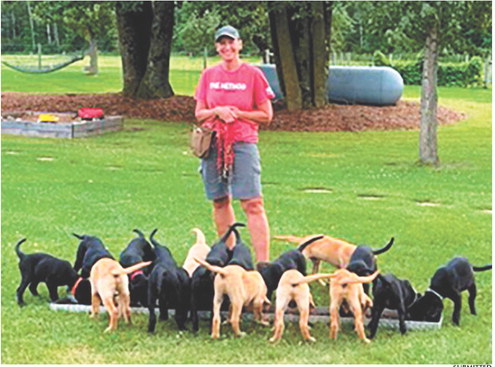
Shannon Piekarz watches over some new recruits for Hay Creek Kennel's detection dog program. SUBMITTED
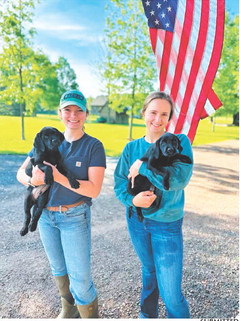
(L to r) Lexi Chaplinski and Brittany Rosemeyer take a few moments out of training to get to know their young prospects. SUBMITTED

